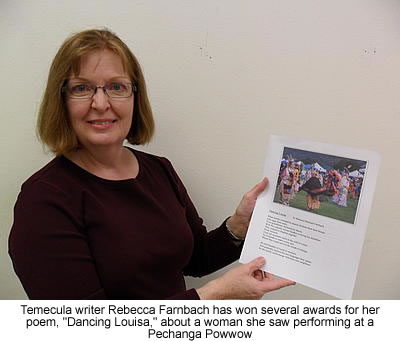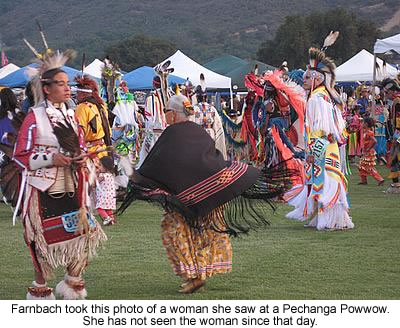 |
Canku Ota
|
 |
|
(Many Paths)
|
||
|
An Online Newsletter
Celebrating Native America
|
||
|
April
1, 2011 - Volume 9 Number 4
|
||
|
|
||
|
Tears,
Poem Flow After Temecula Writer Meets Dancing Woman
|
||
|
by Carl Love - Special
to The Press-Enterprise
|
||
|
credits: Rebecca Farnbach
/ Special to The Press-Enterprise
|
 Rebecca
Farnbach says she wrote her prize-winning poem in about 10 minutes.
Sometimes inspiration works that way. Rebecca
Farnbach says she wrote her prize-winning poem in about 10 minutes.
Sometimes inspiration works that way.
She was at a Pechanga Powwow in July 2008 when she and her husband, Darell, came across an elderly woman resting between dances. They started talking and, for about 15 minutes, the woman told how she had to abandon her American Indian heritage as a child. "I had sunglasses on and she couldn't see the tears streaming down my face," Farnbach said. Her husband also had tears. The woman, who they know only as Louisa, returned to dancing and Farnbach took some pictures. She hasn't seen her since. Farnbach is a lifelong writer who has authored local history books. Yet few things have moved her as much as this American Indian woman's tale. "I couldn't wait to get home to put it on paper," she said. "It was working in my head so hard that I was literally shaking." So she produced "Dancing Louisa," a poem about a woman who grew up in a time when American Indian children could be whisked away from families and sent to schools far away by authorities who thought they were doing the right thing.
That's how Louisa grew up. Louisa's mother wanted her to preserve her roots and took her to places where American Indians, as Farnbach powerfully stated in her poem, "danced with prayers in their feet." "Your mother cried at the edge of the circle, Saying someday you would understand," Farnbach wrote. A half-century later, Louisa still dances at different events. Farnbach has gone to other Pechanga powwows but has never again seen Louisa. What a story she has to share, given that the poem has won three awards, including one from Writer's Digest. Farnbach, 59, grew up in a small Iowa town. At 17, she had a story published in Seventeen magazine about an arts program for kids that she started at the local YMCA. She put writing mostly on hold as she raised two kids, including her son Andy Marshall, who owns Black Market Brewing Co. in Temecula. She got serious again and wrote a novel set in India, a work she hopes to soon get published. Farnbach moved to Temecula in 1988 and became fascinated with local history. Her works on the past in the Arcadia Image of America series include "Temecula," "The Wine Country," "Murrieta," "Murrieta Hot Springs" and "Fallbrook." All were co-written with other locals. Farnbach said Louisa's story resonates because of the woman's quest to find her true roots. Yet few of us have such a powerful story to share -- and inspire. |
|
|
||
|
|
||
| Canku Ota is a free Newsletter celebrating Native America, its traditions and accomplishments . We do not provide subscriber or visitor names to anyone. Some articles presented in Canku Ota may contain copyright material. We have received appropriate permissions for republishing any articles. Material appearing here is distributed without profit or monetary gain to those who have expressed an interest. This is in accordance with Title 17 U.S.C. Section 107. | ||
|
Canku Ota is a copyright ©
2000, 2001, 2002, 2003, 2004, 2005, 2006, 2007, 2008, 2009, 2010,
2011 of Vicki Barry and Paul Barry.
|
||
 |
 |
|
|
The "Canku
Ota - A Newsletter Celebrating Native America" web site and
its design is the
|
||
|
Copyright ©
1999, 2000, 2001, 2002, 2003, 2004, 2005,
2006, 2007, 2008, 2009, 2010, 2011
of Paul C. Barry.
|
||
|
All Rights Reserved.
|
||
 This
woman's grandfather wanted nothing of that. So the family walked
-- yes, walked -- from Arizona over the tall mountains into Colorado
in the cold of winter. The family hid its American Indian heritage
by pretending to be Mexican.
This
woman's grandfather wanted nothing of that. So the family walked
-- yes, walked -- from Arizona over the tall mountains into Colorado
in the cold of winter. The family hid its American Indian heritage
by pretending to be Mexican.